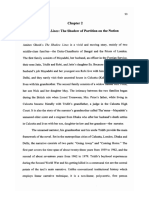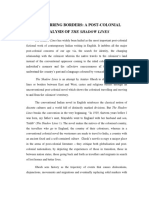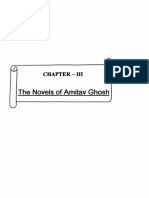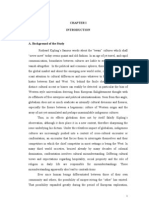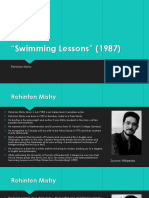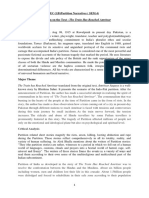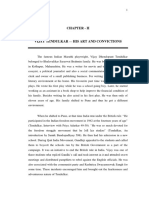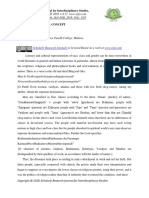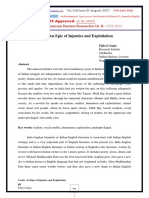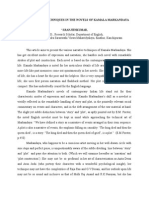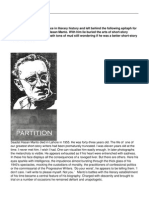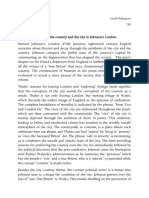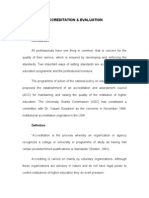Shadows of History in The Shadow Lines
Shadows of History in The Shadow Lines
Uploaded by
aaditotjoCopyright:
Available Formats
Shadows of History in The Shadow Lines
Shadows of History in The Shadow Lines
Uploaded by
aaditotjoOriginal Description:
Original Title
Copyright
Available Formats
Share this document
Did you find this document useful?
Is this content inappropriate?
Copyright:
Available Formats
Shadows of History in The Shadow Lines
Shadows of History in The Shadow Lines
Uploaded by
aaditotjoCopyright:
Available Formats
SHADOWS OF HISTORY IN THE SHADOW LINES. D.S. Bindu Asst. Professor of English Sethu Institute of Technology Kariapatti.
Amitav Ghosh in all his novels tries to retrieve the events tucked behind the pages of history. The Shadow Lines deals with history, independence of India and the partition of the country. The partition was an event whose consequences were entirely unexpected and whose meaning was never fully spelled out or understood either by the politicians who took the decision or the millions of Muslims, Hindus and Sikhs who were to become its victims. The ethnic and social unrest created political chaos within the states. One such event is the riots of 1964. There are no reliable estimates of how many people were killed in the riots of 1964. The number could stretch from several hundred to several thousand; at any rate not very many less than were killed in the war of 1962. (TSL 229) Bengal was a state that saw the greatest bloodshed. Its capital city, Calcutta was the scene of such violence that observers later called the events of those terrible days the Great Calcutta Killing. The population of the two key provinces, Bengal and Punjab were divided among religious groups. The partition required the division of land communities, economic systems and the institutions of state administration and army. East Bengals economy depended on the export of jute, lost its principal port and centre of industry, Calcutta, which went to India. The vast irrigation system in the province of Punjab was disrupted because the frontier cut across its river and the canal system. In the Sikh community there was split into two with its holy city of Amritsar in India and its capital of Lahore in Pakistan. Millions of Hindus remained in Pakistan and one third of the Muslims remained in India. Independence brought the worst civil strife in Indian history and left in its wake intense agony between the people of the two countries. Man creates and recreates history. Some are told; some are untold and lost in oblivion. The riots of 1964 vanished by 1979 without leaving a trace in histories and books. The Hindu-Muslim riot left a panic in the minds of everyone including school children. There were innumerable Muslims in East Pakistan giving shelter to Hindus at the cost of their own lives. In India, Hindus were sheltering Muslims. However, the riots changed everything. The people of both sides reacted with a sense of horror and outrage. Amitav Ghosh tries to present the social, political and economical impact of British rule in India. It is implied that the riots are contemporaneous. The 1964 Calcutta riots, the 1984 Delhi riots, the 1987 Meerut riots or the 1989 Bhagalpur killings, all follow a similar pattern; suspicion, distrust, and rumor activating conditioned minds. While history records that a war took place and a certain number of people died, under the euphemism of casualties, it does not delve into the consciousness of people whose worlds are devastated by violence on an international scale.
Amitav Ghosh points to the abyss of forgotten history which makes any written history incomplete. By the end of Jan 1964 the riots had faded away from the pages of the newspapers, disappeared from the collective imagination of responsible opinion, vanished, without leaving a trace in the histories and bookshelves. They had dropped out of memory into the crater of a volcano of silence. (TSL230) The narrator in the novel has no name. The narrators grandmo ther, Thamma is an important character in the novel. She is a bold middle class Indian woman. She was born and brought up in British India. She felt that it was necessary to kill Englishmen who were reborn in bloodshed during wars. All she wanted was a middle-class life in which like the middle class the world over she would thrive believing in the unity of nationhood and territory, of selfrespect and national power; that was all she wanted, a modern middle class life, a small thing that history had denied her in its fullness and for which she could never forgive it. (TSL151 - 152) In Dhaka, the grandmother was growing like a honey comb. Her home was inhabited by so many branches of the family that they had become confused about their relationships. In the grandmothers memory theirs was a crowded house, everyone living and eating together, her grandparents, her parents, she and Mayadebi, her Jethmoshai her fathers elder brother and his family. When my father was about six, both my grandmothers par ents died, a months of each other. My grandmother returned to Dhaka only twice after that, and then only to make sure that the rooms she and Mayadebi had inherited were still in intact. On both occasions she decided to go across and talk to her uncle and aunt but the house was full of painful memories now and both times she fled back to Mandalay after spending barely a day in Dhaka. (TSL124) The narrators grandmother spent twelve years in railway colonies of Mandalay. She used to go to Dhaka almost every year. In 1935 her husband who was an engineer died of pneumonia. She was 32, no savings and had never worked. She possessed a bachelors degree in history from Dhaka University. She was born and brought up in Dhaka but came to Calcutta long before partition. In 1949, after the partition Dhaka became the capital of East Pakistan. Thammas urge to go to Dhaka and her desire to bring back her uncle Jethmoshi to India is the flaw in her. Those who live in Thammas invented country were Hindus and the enemies. She felt she must rescue her uncle from the Muslims, the inhabitants of East Pakistan. The extent to which she assigns objectivity to her imagined community becomes clear when she asks her son whether she will be able to see the India and East Pakistan from the plane. Her son points out that the barriers becomes clear enough once she goes to her
customs and she will be required to state her nationality, her place of birth, etc. She suddenly becomes confused about her identity: her place of birth does not correspond to her citizenship. However, the grandmother accompanied by her sister Mayadebi, her nephew Tridib, Robi and May Price leave in the Mercedes car to Dhaka. The grandmothers uncle refused to return to India because he rightly felt that people would be drawing borders everywhere and there is no difference between India and Shindia. I understand very well the old man uttered. I know everything. I understand I am everything. Once you start moving you never stop. Thats what I told my sons when they took the trains. I said: I dont believe in this India Shindia. Its all very well you are going away now, but suppose when you get there they decide to draw another line somewhere? What will you do then? Where will you move to? No one will have you anywhere. As for me I was born here and I will die here. (TSL 215) Riot broke out in Dhaka and the mob began to attack them. They then moved towards the man who was looking after the grandmothers uncle. Tridib ran into the mob, and fell upon their backs .He was trying to push his way to through the old man. The mob dragged him in. He vanished. The old man, Tridib and the man who had been looking after the old man, Khalil were killed. The men had melted away, into the gullies. Only three bodies were left. They were all dead. Theyd cut Khalils stomach open. The old mans head had been hacked off. And theyd cut Tridibs throat, from ear to ear. (TSL250 251) The death of grandmothers nephew changed her perception. She pondered of fighting for freedom. The agony turned into anger in the grandmother. The line that was skeptical to her now defined her nationality. In 1965, when the war between India and Pakistan broke out she understood the meaning of freedom as fighting the Pakistanis who were her countrymen twenty years ago. After many years the narrator found the irony of freedom when he revived his memory of 1964 riots in Calcutta. Violence in Calcutta started in 10 th Jan 1964, when the first cricket match of 1964 series against England at Madras commenced. The school bus was nearly empty because a rumor circulated that the whole of Calcuttas water supply was poisoned. The young minds were conditioned to assume that Muslims had poisoned the water. The narrator is cautious to the extent of declining a young Muslim boy called Montu as his friend. In a highly charged atmosphere of suspicion and distrust, rumor becomes institutionalized. The narrator later reads the newspaper report in the Teen Murthy House library. Poisoning of water, train full of dead bodies, all incredible rumors further aggravated communal frenzy and added to violence. The silence was so thick that it took the narrator fifteen years to discover that there was a connection between the riot in Dhaka and a curiously peculiar riot that the narrator experienced as a school boy in Calcutta. Only after laborious construction and deconstruction
of events does the narrator arrive at the truth of what actually happened and of why Tridib was killed. The official histories were unable to supply an answer. There is only silence and absence of meaning. The narrators father did not prevent Tridib, May and his grandmother from going to Dhaka in that period because he didnt know about the riots in Khulna that were to trigger off the events in Dhaka and why? Because the newspaper he read did not mention it. It was after all a Calcutta paper run by people who believed in the power of distance no less than I did. (TSL 227) The Dhaka riot was set aflame with the repercussion of the Hazratbal incident in distant Kashmir. The Hazratbal shrine sheltering the holy Relic had become a great centre of pilgrimage, multitudes of people, Kashmiris of every religious faith, would throng to the shrine on occasions when the Relic was displayed. On 27 December, 1963, two hundred and sixty-three years after it had been brought to Kashmir, the Mu-i-Mubarak disappeared from its place in the Hazratbal mosque. Mischievous political and religious forces soon disrupted the collective display of mourning. The edifice of unity shattered resulting in large scale riding not only in the country but also in other parts of the sub-continent. The communal riots in Khulna spread to Dhaka and found its reflection in Calcutta also. It was only a trivial news to the people of other states. Tridib was merely another victim of the endless silence. Robis loss of his brother Tridib in the 1964 riot haunted him. He felt that nobody understood the meaning of freedom. If they did they would have avoided killings even now. To Robi the concept of freedom is a mirage. And then I think to myself why dont they draw thousands of little lines through the whole subcontinent and give every little place a new name? What would it change? Its a mirage, the who le thing is a mirage. (TSL 247) Tridibs death signifies the futility of freedom. Ghosh revisits the 1964 riot to revive the events that are excluded from the history of the nation. He presents the painful struggle of the Hindus and Muslims. Amitav Ghosh illuminates the absurdities of borders and reveals the irony of freedom politically, socially, economically and psychologically. The riots vanished from the history to become shadows leaving panic in the minds of people. WORKS CITED Ghosh Amitav. The Shadow Lines. New Delhi: Ravi Dayal, 2001. Bharucha, Nilifer E. and Vrinda Nabar Mapping Cultural Spaces: Postcolonial Indian Literature in English - Essays in Honour of Nissim Ezekiel. New Delhi: Vision Books Pvt. Ltd., 1998. Kapadia, Novy. Amitav Ghoshs The Shadow Lines. New Delhi: Asia Book Club, 2001.
Mittapalli, Rajeshwar and Alessandro Monti. Commonwealth Fiction: Twenty-First Century Readings. New Delhi: Atlantic Publishers. 2002. Nanavati, U.M. and Prafulla C. Kar. Rethinking Indian English Literature. Delhi. Pencraft International, 2000.
Kapadia, Novy. Imagination and Politics in Amitav Ghoshs The Shadow Lines, The New Indian Novel in English: A Study of the 1980s. Viney Kirpal(Ed.). New Delhi: Allied Publishers Ltd., 1990. Majumdar, Sharmila Guha. Amitav Ghoshs The Shadow Lines and In an Antique Land: Some Thematic Considerations, Indian Literature Today: Vol.1: Drama and Fiction. R.K.Dhawan (Ed.) New Delhi: Prestige Books, 1994. Sircar, Arjiya. The Shadow Lines: The Promise of Another Dawn, Recent Indian Fiction. R.S.Pathak (Ed.) New Delhi: Prestige Books, 1994. Rao, K.Damodar. Silence as Possible Mode of Response in Amitav Ghoshs The Shadow Lines. Kakatiya Journal of English Studies 13. (1993). Rao, Nagesh. Cosmopolitanism, Class and Gender in The Shadow Lines. South Asian Review 24.1 (2003).
--------------------------------------------
- Frank A. Clark
You might also like
- Representation of Caste Issues in Antarani VasanthamDocument6 pagesRepresentation of Caste Issues in Antarani VasanthamHfyjhchvhNo ratings yet
- Unofficial Transcript - Seneca College - March 20, 2022Document2 pagesUnofficial Transcript - Seneca College - March 20, 2022Jackie Mercado100% (1)
- CRISC AiODocument272 pagesCRISC AiOJetob100% (6)
- Power Words: Words That Will Win Your Ex BackDocument20 pagesPower Words: Words That Will Win Your Ex Backderek652853% (15)
- Katamino RulesDocument8 pagesKatamino RuleslejozsefNo ratings yet
- Accounting ProjectDocument107 pagesAccounting Projectapi-353552300100% (2)
- Positionpaper Mistry SwimmingLessons Kapralova 2012 PDFDocument8 pagesPositionpaper Mistry SwimmingLessons Kapralova 2012 PDFSushobhan MazumdarNo ratings yet
- 06 - Chapter 2Document45 pages06 - Chapter 2Mousumi MondalNo ratings yet
- The Blurring Borders: A Post-Colonial Analysis of The Shadow LinesDocument13 pagesThe Blurring Borders: A Post-Colonial Analysis of The Shadow LinesFitness BroNo ratings yet
- 4.format - Hum.literature of Partition An Analysis of Suffering After 1947 - 1 - RewrittenDocument6 pages4.format - Hum.literature of Partition An Analysis of Suffering After 1947 - 1 - RewrittenImpact JournalsNo ratings yet
- 05 Chapter 3Document162 pages05 Chapter 3Surajit MondalNo ratings yet
- The Calcutta Chromosome: A Kind of Mystery ThrillerDocument33 pagesThe Calcutta Chromosome: A Kind of Mystery ThrillerAmarendra Kumar AvinashNo ratings yet
- Indian Writing in English Assingment: Background Reading and PoetryDocument3 pagesIndian Writing in English Assingment: Background Reading and PoetrySrishti RayNo ratings yet
- Chapter IVDocument73 pagesChapter IVKusuma Wijaya100% (1)
- "Swimming Lessons" by Rohinton MistryDocument5 pages"Swimming Lessons" by Rohinton MistryEeshitaNo ratings yet
- Enterprise PDFDocument5 pagesEnterprise PDFmanmalNo ratings yet
- Eng TuglaqDocument5 pagesEng TuglaqNagnath TotawadNo ratings yet
- 06 - Chapter 3 PDFDocument37 pages06 - Chapter 3 PDFSomanath PradhanNo ratings yet
- "Swimming Lessons" (1987) : Rohinton MistryDocument25 pages"Swimming Lessons" (1987) : Rohinton MistrySam CruzeNo ratings yet
- Partition Narratives, Sem 4Document2 pagesPartition Narratives, Sem 4Kajal JaiswalNo ratings yet
- Rohinton Mistry, 'Swimming Lessons'Document18 pagesRohinton Mistry, 'Swimming Lessons'aaasNo ratings yet
- The Concept of The Nation-State and Tagore's Idea of NationalismDocument11 pagesThe Concept of The Nation-State and Tagore's Idea of NationalismMd Intaj AliNo ratings yet
- Stylistic Analysis of Language of Anita DesaiDocument32 pagesStylistic Analysis of Language of Anita DesaiAbdelhak SaddikNo ratings yet
- Study of The Author Amitav GhoshDocument6 pagesStudy of The Author Amitav GhoshAlrhea FurtadoNo ratings yet
- Analysis of Women Voices in Kamala Das PoetryDocument9 pagesAnalysis of Women Voices in Kamala Das Poetryhaloheru100% (1)
- Compiled and Designed and Modified By:: Mr. Milan Mondal, Assistant Professor, Dept. of English, Narajole Raj CollegeDocument3 pagesCompiled and Designed and Modified By:: Mr. Milan Mondal, Assistant Professor, Dept. of English, Narajole Raj CollegeShubhadip AichNo ratings yet
- Meera Syal As A Diaspora WriterDocument2 pagesMeera Syal As A Diaspora WriterAakriti PantNo ratings yet
- Fragmented Memories Analysing The NarratDocument9 pagesFragmented Memories Analysing The NarratRatan RoyNo ratings yet
- Pakistanization of English in Kamila Shamsie's Kartography PDFDocument17 pagesPakistanization of English in Kamila Shamsie's Kartography PDFNaeem JadoonNo ratings yet
- Tagore NationalismDocument16 pagesTagore Nationalismapi-252938645No ratings yet
- Options Basics 01Document52 pagesOptions Basics 01sam2004No ratings yet
- Post Colonial Perspectives in Badal Sircar's Indian History Made EasyDocument5 pagesPost Colonial Perspectives in Badal Sircar's Indian History Made EasySharuk Rahaman0% (1)
- Vi Desse LieDocument4 pagesVi Desse LieRahul KumarNo ratings yet
- Anand CoolieDocument4 pagesAnand CoolieVipul BhavsarNo ratings yet
- Desirable DaughtersDocument7 pagesDesirable DaughtersDr. Tulika KakkarNo ratings yet
- Kamala DasDocument11 pagesKamala Daslubna_rahman2002100% (1)
- Chapter - IiDocument32 pagesChapter - IiKapil MilhotraNo ratings yet
- Amitav Ghoshs The Shadow Lines Problematics of NaDocument4 pagesAmitav Ghoshs The Shadow Lines Problematics of NaPunyo SarmingNo ratings yet
- AssignmentDocument13 pagesAssignmentYasir Aslam100% (1)
- TughlaqDocument5 pagesTughlaqSameer MayekarNo ratings yet
- BlindnessinandhayugDocument2 pagesBlindnessinandhayugVaibhav MishraNo ratings yet
- AndhayugpostindependenceDocument1 pageAndhayugpostindependenceVaibhav MishraNo ratings yet
- The Shadow Lines Additional NotesDocument39 pagesThe Shadow Lines Additional NotesShahruk Khan100% (1)
- 05 - Chapter1 (Indo-English Literature) PDFDocument71 pages05 - Chapter1 (Indo-English Literature) PDFAnonymous 9hu7fl100% (1)
- Dalit Literature AssignmentDocument2 pagesDalit Literature Assignment35 IshaNo ratings yet
- Listen To The Heron's WordsDocument244 pagesListen To The Heron's WordsKristine JacksonNo ratings yet
- Concept of Nationalism With Wound of Partition in Amitav Ghosh's "The Shadow Lines"Document5 pagesConcept of Nationalism With Wound of Partition in Amitav Ghosh's "The Shadow Lines"IOSRjournal0% (1)
- 09 - Chapter 3 PDFDocument44 pages09 - Chapter 3 PDFshivamNo ratings yet
- Dalit Literature: A ConceptDocument6 pagesDalit Literature: A ConceptAnonymous CwJeBCAXpNo ratings yet
- Coolie A Saga of ProtestDocument7 pagesCoolie A Saga of ProtestRajkumari ShrutiNo ratings yet
- Significance of Trains in Khushwant Singh's Train: To PakistanDocument10 pagesSignificance of Trains in Khushwant Singh's Train: To PakistanDominic SavioNo ratings yet
- The Narrative Techniques in The Novels of Kamala Markandaya: J.RanjithkumarDocument11 pagesThe Narrative Techniques in The Novels of Kamala Markandaya: J.RanjithkumarPushpanathan ThiruNo ratings yet
- Karnad Folk Strategies PDFDocument5 pagesKarnad Folk Strategies PDFshivaa111No ratings yet
- Dipesh ChakrabartyDocument30 pagesDipesh Chakrabartyignoramus83No ratings yet
- East West ConflictDocument30 pagesEast West ConflictIrfan AhmadNo ratings yet
- Indian Writing in EnglishDocument65 pagesIndian Writing in Englishkv117No ratings yet
- Summary of The Imam and The Indian by Saher Hiba KhanDocument1 pageSummary of The Imam and The Indian by Saher Hiba KhanSaher Hiba Khan100% (1)
- Written by Tariq AliDocument8 pagesWritten by Tariq AliLevin AhmedNo ratings yet
- 06 - Chapter 1 PDFDocument37 pages06 - Chapter 1 PDFVishal RaiNo ratings yet
- Language in 'In Custody'Document2 pagesLanguage in 'In Custody'Drishti AroraNo ratings yet
- The Dalit Theatre (Rangbhoomi) in MaharashtraDocument5 pagesThe Dalit Theatre (Rangbhoomi) in Maharashtraharesh1883No ratings yet
- The Theme of The Country and The City in PDFDocument4 pagesThe Theme of The Country and The City in PDFROUSHAN SINGHNo ratings yet
- Rabindranath Tagore's The Wife's Letter: A Story Reveals Patriarchal DominationDocument4 pagesRabindranath Tagore's The Wife's Letter: A Story Reveals Patriarchal DominationManoj JanaNo ratings yet
- Thoughts in Ambikagiri's WritingsDocument34 pagesThoughts in Ambikagiri's WritingsAltamash AliNo ratings yet
- Positive Aspects of Phil. ValuesDocument13 pagesPositive Aspects of Phil. ValuesJaymar MagtibayNo ratings yet
- 00 Midgard RPGDocument2 pages00 Midgard RPGPaul SavvyNo ratings yet
- Lesson 7 - Sexual BehaviorsDocument10 pagesLesson 7 - Sexual BehaviorsApril CaringalNo ratings yet
- Non Compliance ApplicationDocument10 pagesNon Compliance ApplicationRAJARAJESHWARI M GNo ratings yet
- Fortification of Rice: A. P. State Civil Supplies Corporation LimitedDocument9 pagesFortification of Rice: A. P. State Civil Supplies Corporation Limitedcharsaubees420No ratings yet
- ReportDocument1 pageReportTahsheen sarwarNo ratings yet
- Video Guide Part 1 America Before ColumbusDocument2 pagesVideo Guide Part 1 America Before Columbusapi-286657372No ratings yet
- Chapter 4 Structured QuestionsDocument8 pagesChapter 4 Structured Questionsteresa tsoiNo ratings yet
- Mumtaz Bibi-W.P 4227 of 2021Document56 pagesMumtaz Bibi-W.P 4227 of 2021Sarah B. Haider100% (1)
- Safety Task AssessmentDocument4 pagesSafety Task AssessmentRahul BharadwajNo ratings yet
- Sample Final Test - KEYDocument1 pageSample Final Test - KEYlee hoangNo ratings yet
- List of Domains For Renewal/ Register: - : Title Category DomainDocument1 pageList of Domains For Renewal/ Register: - : Title Category DomainRemya menonNo ratings yet
- AccreditationDocument35 pagesAccreditationSatish PatilNo ratings yet
- Business PlanDocument24 pagesBusiness PlanSAJEEL ARSHAD100% (1)
- 5-Third Eye Project KPDocument35 pages5-Third Eye Project KPNexus vijayawadaNo ratings yet
- 2014 - Jan Otto - EEDI VerificationDocument20 pages2014 - Jan Otto - EEDI Verificationhamedullah mNo ratings yet
- Final Revised PaperDocument6 pagesFinal Revised PaperJayvee Perciano DistajoNo ratings yet
- The SquatterDocument13 pagesThe SquatterPrince NetworkNo ratings yet
- Service Manual: HCD-GR8000Document16 pagesService Manual: HCD-GR8000Vitorio LogoNo ratings yet
- Time Value of MoneyDocument108 pagesTime Value of MoneyHaider WaseemNo ratings yet
- Kuboja PHD Thesis SubmittedDocument142 pagesKuboja PHD Thesis SubmittedFalmata AtNo ratings yet
- 02769K HT F450BK Eng - Mic 0218 PDFDocument30 pages02769K HT F450BK Eng - Mic 0218 PDFbintangaditya19No ratings yet
- Organ The Classical and Medieval OrganDocument11 pagesOrgan The Classical and Medieval OrganTimothy ThygoNo ratings yet
- Literature: The Aged Mother VALUES INTEGRATION: (PVMGO-CV) Honesty, Cleverness, Integrity, andDocument9 pagesLiterature: The Aged Mother VALUES INTEGRATION: (PVMGO-CV) Honesty, Cleverness, Integrity, andNeema RelucioNo ratings yet
- The Lowdown On Number Talks-4Document4 pagesThe Lowdown On Number Talks-4api-535847665100% (1)







